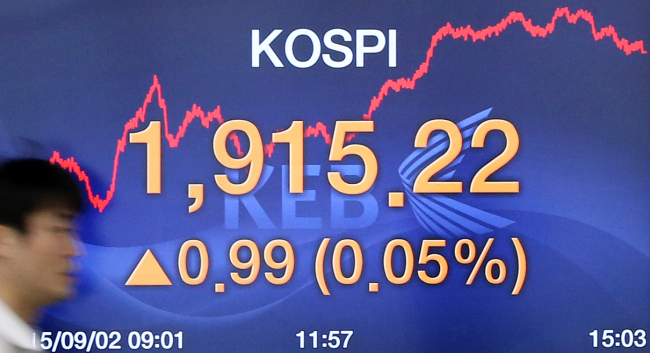South Korea’s stock market weathered the overnight plunges of equities on the European and U.S. bourses, despite the aggravated concerns about possible global deflation from China’s economic slowdown.
The KOSPI gained 0.99 points or 0.05 percent from a trading session earlier to close at 1,915.22 on Wednesday, though the benchmark index started in a bearish position earlier in the day.
While some analysts claimed the Korean index is considered to have hit the bottom in late August, others say the gain was only thanks to a temporary rebound for several hours in the Shanghai Stock Exchange Composite Index.
 |
(Yonhap) |
While the overnight drop of stocks in Western markets including the U.S., the U.K., France and Germany ranged between 2.38 percent and 3.03 percent, the Shanghai index was gaining during the first half of its daily session. It, however, inched down 0.2 percent to close at 3,160.17 at 4 p.m. (Korean time) -- an hour after the KOSPI’s finish.
Many analysts are of the view that in the coming weeks the KOSPI would continue to be coupled with the Shanghai index, unlike its ordinary synchronization with the U.S. Dow Jones industrial average. The KOSPI was on a losing streak for 90 minutes before the Chinese market opened at 10:30 a.m. (Korean time) on the day.
“Local shares have successfully bounced back as a certain technical rebound. But it is expected that the index would face another correction amid the ongoing uncertainty at home and aboard,” said a research analyst from KDB Daewoo Securities.
He predicted that the KOSPI would range between 1,850 and 1,950 on a short-term basis, picking international oil prices as a key factor determining the future direction of the index.
On the local main bourse, foreign investors maintained their net-selling streak for the 20th consecutive session since Aug. 5 by offloading stocks worth 86.5 billion won ($74 million) on the day. In contrast, local public pension funds have been net-buyers over the past few weeks.
Foreign investors have dumped 4 trillion won worth of stocks over the past month, recording their longest net-selling spell in seven years after it reached 33 consecutive sessions between June 9 and July 23 in 2008.
The secondary KOSDAQ rose by 5.08 points, or 0.75 percent, to close at 678.02.
The U.S. dollar rose 8.9 won to finish 1,180.7 won. The volatility of the won-dollar exchange rate has widened ahead of the monthly gathering of the Federal Open Market Committee, slated for Sept. 16-17 in Washington, D.C.
The Korean market has been swayed by the stance of policymakers at the Federal Reserve after committee members commented on the need to taper off its massive money printing program in 2013, shifting from their earlier position.
Japan and Europe in turn followed the U.S. in the quantitative-easing policy. And China is pushing for a monetary easing to boost its GDP.
Analysts forecast that it would not be easy for the Bank of Korea to change the current base rate of 1.5 percent before the FOMC meeting. The BOK rate-setting committee is to convene on Sept. 10.
By Kim Yon-se (
kys@heraldcorp.com)








